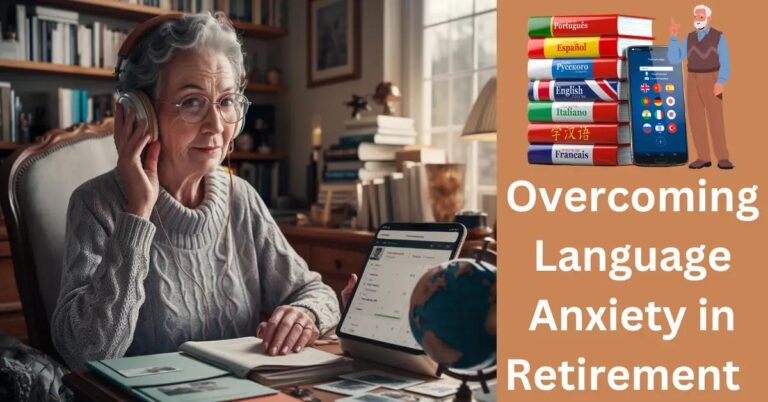TL;DR:
- Retirees can learn new languages with realistic goals focusing on basic skills.
- Daily practice and using simple techniques like mnemonics and repetition enhance learning.
- Community support, classes, and language meet-ups can aid progress.
- Free resources like Duolingo and libraries offer accessible language learning.
- Basic skills include listening, speaking, reading, and writing.
- Non-verbal communication, patience, and humor help overcome language barriers abroad.
- Understanding cultural contexts, idioms, and local customs is crucial.
- Participating in local events enhances language and cultural connections.
- Language opens doors to deeper relationships and enriches experiences abroad.
Learning a new language in your golden years? It sounds exciting yet daunting, right? As retirees, understanding a few basic phrases can indeed help, but is it truly enough for a smooth transition? In this post, I’ll explore how seniors can set realistic language goals to thrive abroad. We’ll talk about memory games, language apps for seniors, and even fun learning methods that fit your lifestyle. Join me on this language journey!
How Can Retirees Effectively Approach Learning a New Language?
Can a 70-year-old learn a new language? Yes, they can. Many retiree language learners have found success. It is crucial, though, to have realistic goals. Do not expect to be fluent quickly. Focus on basic skills. These skills include speaking simple phrases, understanding common words, and reading basic sentences.
Daily practice is key. Fit language practice into your daily life. Listen to the local radio during breakfast, for example. Set a goal to learn one new word each day. Naming objects around the house is another way. These habits build language over time.
Older adults often prefer certain learning styles. Many enjoy visual aids, like charts or images. Others learn well through conversation. Try different methods to see what works best for you.
Memory-enhancing techniques help as well. Mnemonics can aid in remembering words. Repetition reinforces learning. Try teaching someone else what you have learned, it helps reinforce your own knowledge.
Community support boosts language learning. Join local language classes or meet-ups. It is powerful to learn with others. Friends offer encouragement and support. They also provide opportunities for practice.
Lastly, always be patient with yourself. Each small victory builds courage. Learning a foreign language is a journey. Enjoy each step along the way.
What resources are available to help seniors learn a language abroad?
What is the free foreign language for seniors? Duolingo offers a free app for learning. It’s easy to use with fun lessons. Many other apps also help, but some cost money. These apps focus on simple words and phrases.
Language classes for older adults are also great. They often teach slowly, focusing on conversation. Look for classes at nearby community centers or libraries. They often offer low-cost or free classes.
Another way to learn is through language exchange programs. These programs pair you with someone who speaks the language. You practice together and help each other learn.
Seniors can also use technology tools and gadgets. Electronic translators are handy. They can quickly translate words and sentences. Some of these gadgets speak the words, which helps with pronunciation.
What are the basic foreign language skills? Basic skills include listening, speaking, reading, and writing. Listening helps you understand what others say. Speaking lets you use new words in conversation. Reading signs or menus helps navigate. Writing will let you send messages or notes.
Retiree-friendly language tech makes learning simple. Many apps have senior-friendly interfaces. They focus on audio and visuals. This helps retirees with different learning styles.
Seniors should explore local community centers. They often have clubs or meetups for language learners. These groups give real-life practice and support.
Retirees can find free and affordable resources everywhere. Libraries often have books or CDs to borrow. Online, many resources cost little or nothing. Look for free podcasts, videos, or language games.
Remember, learning new language skills is a journey. With the right resources, anyone can learn and enjoy it.
How Can Retirees Overcome Language Barriers When Living Overseas?
Retirees often face language barriers abroad. How can retirees overcome language barriers? By focusing on effective communication skills. Start with learning key phrases. These can help in essential daily tasks. With these phrases, asking for directions or ordering food becomes easier.
Understanding local dialects and accents is important too. Listen to local radio stations or watch TV shows. These help train your ear to different sounds.
Non-verbal communication is another resource. Use gestures and facial expressions to convey meaning. Smile warmly when greeting locals. It can make interactions friendlier.
Joining language clubs and meetups can aid social integration. These communities welcome expats eager to learn and connect. They offer a relaxed setting to practice speaking. Retirees can share experiences and language tips within these safe spaces.
Consider these strategies. They build practical communication skills. Retirees like Mary, who lived in Spain, thrived without perfect Spanish. She volunteered in a school, using simple phrases and gestures. Her passion for art helped break the ice with locals.
Retirees often overlook the power of patience and humor. Frustrating moments will happen. Laughing off misunderstandings can ease tension. Remember, locals usually appreciate your effort to learn.
Successful retirees treat language as part of their adventure. Each new word and phrase opens doors to deeper connections. Such connections enrich their lives abroad.
What cultural aspects should retirees consider when using local languages abroad?
When you retire abroad, understanding cultural context becomes vital. You might ask, “What is the best language for expats?” There’s no one-size-fits-all answer. Choose the language spoken where you live. It’s important for deeper connections.
Language is more than words. It’s a powerful tool for better cultural understanding. Through language, you engage in meaningful exchanges. This helps you grasp cultural norms and values.
Local idioms and phrases carry cultural significance. They reflect history and emotions. Learning them boosts your community participation through language. It helps you connect, laugh, and share with locals. Be open to the cultural richness these phrases bring.
Cultural sensitivity in communication is essential. Avoid jokes or comments that may offend others. Respect people’s customs and beliefs. This enhances cultural interaction with language skills. You show care and willingness to adapt to your new home.
Building cross-cultural friendships is key. Language plays a pivotal role here. Often, it opens doors to trust and understanding. For example, a simple phrase in the local language can warm a neighbor’s heart. Your efforts demonstrate respect and interest.
Engage in cultural activities to enhance language skills further. Attend local events, join clubs, or visit cultural centers. These interactions enrich your language and cultural knowledge. They help integrate you into the community through shared experiences.
Learning etiquette and protocol related to language is crucial. For instance, in some cultures, eye contact is vital. In others, it’s considered rude. Understanding these nuances fosters smoother interactions and avoids misunderstandings.
Retirement abroad offers a chance to immerse yourself in new experiences. Embrace language as a gateway to understanding and celebrating another culture. Through language, you participate and thrive in your new community.
Conclusion
Retiring abroad gives you the chance to learn a new language. Set clear goals. Practice a little every day, making it part of your routine. Choose the best learning style that suits you. Memory tricks can help a lot. Join groups and seek encouragement from others. Use apps and classes made for older adults. Dive into community language programs. Know cultural nuances and engage in cultural experiences. With these steps, you can communicate confidently and connect deeply in your new home.







